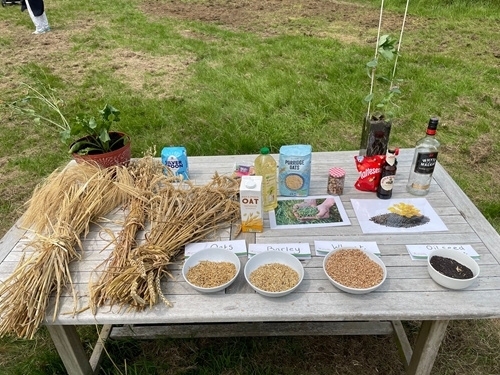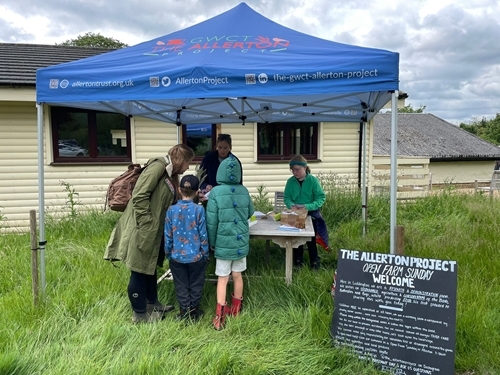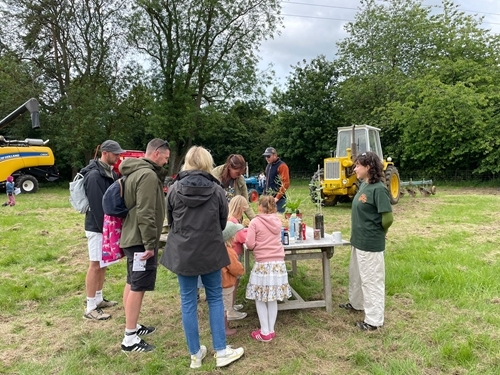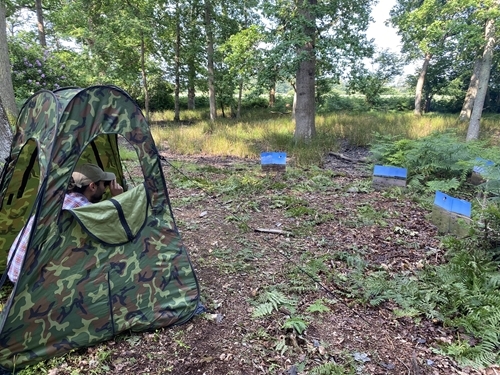Open Farm Sunday has been taking place up and down the country in June every year since 2006. Managed by LEAF (Linking Environment and Farming), the day provides an opportunity for farmers to share their fabulous work with all ages, by opening their farms to the general public, and showcasing the many goods and services they provide. It connects both rural and urban communities with the local farms and farmers who help produce the food they eat.
This year the Game & Wildlife Conservation Trust (GWCT) took part in several events across the country.

The Allerton Project in Leicestershire
By Joe Stanley, Head of Sustainable Farming, Training & Partnerships at the Allerton Project
“It’s always a highlight of the Allerton year to host LEAF Open Farm Sunday and welcome hundreds of people from the surrounding towns and villages to experience the reality of the farmed countryside.
“It’s never been more important to show people where their food comes from, and how British farmers are leading the way in nature and climate friendly farming – in no small part thanks to the work of the Allerton Project and GWCT over the last three decades.
“This year, we had more than 300 visitors who were able to experience a tractor and trailer ride around the farm, view our machinery and livestock displays, talk to our science team about soil, bugs and beasties and our friends from Kings Crops about their environmental crops. It was a great day filled with positive conversations – and fantastic cake as provided by the Loddington WI!”

Raby Estate in County Durham
By Rebecca Barber, Interim North of England Manager
“The GWCT’s North of England team was pleased to participate in the North Pennines Moorland Group’s Open Farm Sunday event, hosted at the Raby Estate. This initiative is part of the national celebration promoting awareness of farming and land management, which in the north includes managing our moors and uplands.
“Our focus was on the importance of grouse moor management for a range of species—not only red grouse, but also many ground-nesting birds found across upland areas.
“Although some children and adults were initially unfamiliar with many of the species on display, they left with a deeper appreciation of the ecological challenges involved. We discussed how gamekeepers work year-round to support bird populations and strike a sustainable balance that enhances survival rates.”

Glendale Countryside Learning Day
By Rebecca Barber, Interim North of England Manager
“The GWCT was proud to attend one of our favourite annual events - the Glendale Countryside Learning Day. Attended by around 1,700 children, the day brings rural education to life for primary school pupils from across the region.
Day. Attended by around 1,700 children, the day brings rural education to life for primary school pupils from across the region.
“Our team welcomed students into the GWCT tent, this year presented in collaboration with Scotland’s Regional Moorland Group. Activities included a three-legged stool demonstration using a 100-year-old wooden milking stool, and an engaging session on the relationship between predator and prey. We also delivered educational content on deer populations in the UK and the growing risks associated with Lyme disease.
“Further discussions focused on how predator control influences the food chain. Children were invited to sample venison sausages, pheasant sausages, and venison pasta provided by EatWild, helping them make a tangible connection between conservation and food sourcing.
“These interactive experiences consistently spark curiosity and thoughtful debate. As one example, it’s not uncommon for students to conclude that reducing predator numbers is necessary to protect vulnerable species—raising important questions about how we balance ecological needs with emotional responses.”
Bisterne Estate in Hampshire
By Louise Shervington, Publications Officer
“Open Farm Sunday at Bisterne near Ringwood was once again a huge success with 4,000 visitors who enjoyed seeing first-hand how a farm works with tours of the dairy and other buildings.
“Visitors were greeted with an array of farm machinery, from modern combines to older threshing machines, and were also treated to tractor-and-trailer rides taking them up to a woodland walk where the could visit the GWCT’s stand, as well as those of the New Forest National Park Authority (NFNPA) and Bisterne Estate.
“Children could try to ‘spot the lapwing and their nests’ with an interactive GWCT display, learn all about deer and predators and take part in an exciting game of ‘guess the poo’ before going onto build dens in the woods.
“The NFNPA stand explained about the decline of curlew and why it is important for dog walkers to pick up after their dogs – research shows that dog poo left in the forest helps sustain a high fox population, which is detrimental to ground-nesting birds such as curlew.
“There was a chance to try your hand at fly fishing and by visiting the stands of the Beekeepers Association, the New Forest Commoners and the New Forest Bloodhounds - where the hounds were happy to be petted - visitors learnt more about how the countryside works.
“The New Forest Hounds (known as The Hunt) have converted to a bloodhound pack from a trail hunting pack. Since 2022 the hunt the ‘the clean boot’ - the natural scent of a human runner.”
